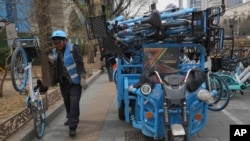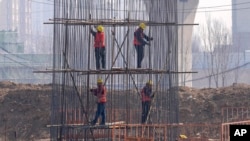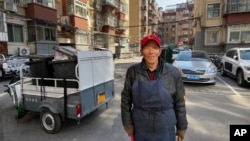Guan Junling, 53, is too old to be employed by the factory anymore. But for migrant workers like her, not working is not an option.
For decades, they have migrated from rural areas to cities in search of work. They toiled in sweatshops, built apartment buildings they could never afford, and played a crucial role in China’s transformation into an economic powerhouse.
As they age, first-generation migrant workers struggle to find jobs amid a slowing economy. Many are financially strapped and must continue to search.
“Rural people do not have ‘retirement’ or ‘pension’ and can only rely on themselves and work.” Guan said. “When can you stop working? It’s really not until you have to lie in bed and not be able to do anything.”
She now relies on her house cleaning job, working long hours to save a little money for emergencies. Migrant workers can receive medical subsidies in their hometowns, but have little or no health insurance elsewhere. If Guan needed to go to a hospital in Beijing, she would have to pay out of pocket.
As China’s population ages, so too do its migrant workers. By 2022 (the latest year for which data are available), approximately 85 million people will be over 50, accounting for 29% of all migrant workers, up from 15% a decade ago. With limited or no pensions and health insurance, they need to continue working.
Qiu Fengxian, a scholar of rural sociology who described her research in a speech last year, said that in questionnaires distributed to 2,500 first-generation migrant workers between 2018 and 2022, about 75% said they would work in their 60s. Age and above working. The first generation refers to people born in the 1970s or earlier.
Older workers are getting a double whammy. Construction jobs are drying up due to the housing downturn, while factory jobs are drying up due to automation and a slowing economy. Age discrimination is common, so jobs tend to go to younger people.
“Of course, for young people, you can still find jobs and positions are available, although the wages are not high enough,” said Zhang Chenggang of Beijing’s Capital University of Economics and Business, who heads the university’s new employment forms research center. .
“But for older migrant workers, there are no jobs at all,” said Zhang, who conducted field research in four labor markets in China late last year. “The thing now is, no matter how low the salary, as long as someone is paying you, you’re going to take the job.”
Some recruiters contacted by The Associated Press said older workers were less effective at their jobs or had underlying medical conditions. Others refused to answer and hung up.
Many people turned to temporary work. On a cold winter day late last year, Zhang Zixing was looking for a job in a huge outdoor labor market in the suburbs of Beijing.
He said that about three years ago, when he was 55, he was fired from a job delivering packages because of his age. Last December, he was earning 260 yuan (about $35) a day installing cables at a construction site.
Zhang Quanshou, a village official in Henan Province and a deputy to the National People’s Congress, said some older migrant workers are simply looking for work near their hometowns, while others still head to big cities.
“Some older migrant workers are looking for temporary jobs, so it is very important to establish a temporary job market and provide a better platform for such services,” Zhang, the village party secretary, said in a recent email response to questions. Annual meeting of the General Assembly.
Ms. Guan, who comes from a northern rice-growing region, worked on an assembly line in a garment factory until she was fired in her 40s. Subsequently, she worked various jobs in different cities and came to Beijing in 2018.
She works seven days a week, in part because she fears the labor agency won’t call again if she turns down the job offer.
During the Lunar New Year holiday in February, in accordance with the custom of migrant workers returning home to visit their families, she stayed in Beijing to take care of an elderly woman because the woman needed help and money.
“People either want educated people or they want young people, and I don’t meet those two requirements,” Guan said. She dropped out of school after high school because her parents only had enough money to educate their son. “But then I thought, no matter what other people think of me, I have to live.”
Guan worries that it will be more difficult to find a job at the age of 55. The retirement age for women in China is 50 or 55, depending on the company and type of job. For men, the number is 60.
Union official Lu Guoquan suggested relaxing working age limits, judging workers by their physical condition rather than their age, and making it easier for the elderly to find jobs through the labor market and online platforms.
“A large number of farmers have moved into cities and made important contributions to the modernization of our country,” he said in a proposal he made to an advisory body during the recent national congress and seen by The Associated Press.
As workers age, “they gradually become a relatively disadvantaged group in the labor market and face some barriers and problems in continuing to work,” the report said.
Lu, director of the General Office of the All-China Federation of Trade Unions, declined to be interviewed.
Duan Shuangzhu, who is in her 40s, gave up raising sheep and cattle in northern China’s Shanxi province and has been picking up trash in a Beijing neighborhood for 25 years. He gets up at 3:30 a.m. seven days a week to make his rounds. For this, he earns 3,300 yuan ($460) a month and has a basement to live in.
Duan’s wife stayed on the farm to take care of her grandson. Mr. Duan managed to save money for himself, his children, and his grandchildren, but never contributed to the pension system, leaving what little income he had to his family.
This fits the pattern Qiu found in her research, which she published in a book last year. She found that older migrant workers moved to cities to improve the lives of their children and other relatives, rather than themselves. Most people have limited or no savings, and few are able to climb the economic ladder. They want their children to do the same, but most end up becoming migrant workers as well.
Qiu said in his speech that most migrant workers’ income is spent on their children’s marriage, family and education. “Basically, they don’t start working on themselves and planning for their old age until they’re 55.”
Duan, 68, has no plans to quit.
“As long as I can work every day, that’s enough to survive,” he said, standing next to a set of community bins color-coded for recycling. “I didn’t grow up in a wealthy family, and filling my stomach every day was enough for me.”
Follow us on Google news ,Twitter , and Join Whatsapp Group of thelocalreport.in



















